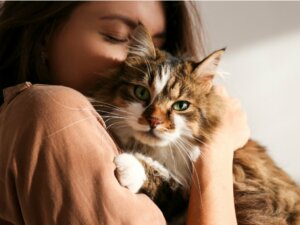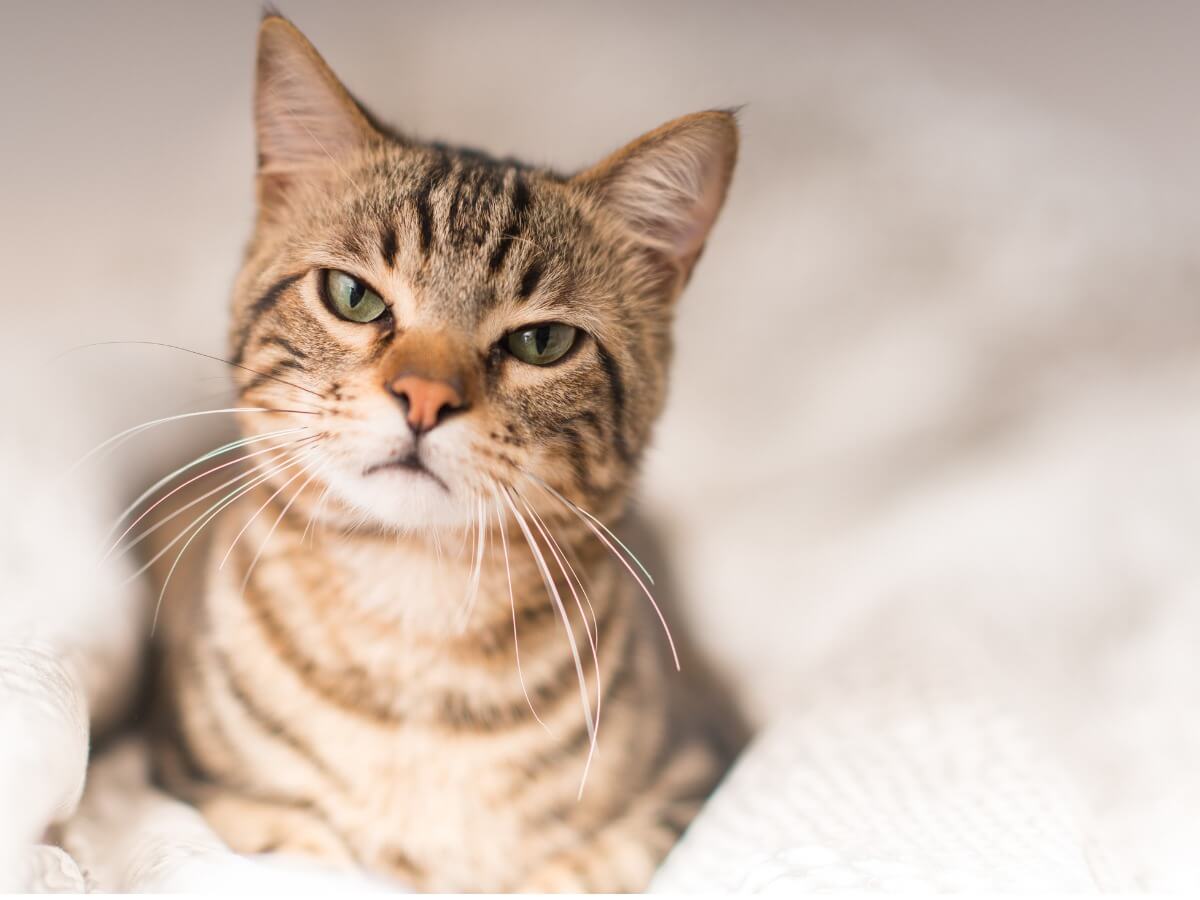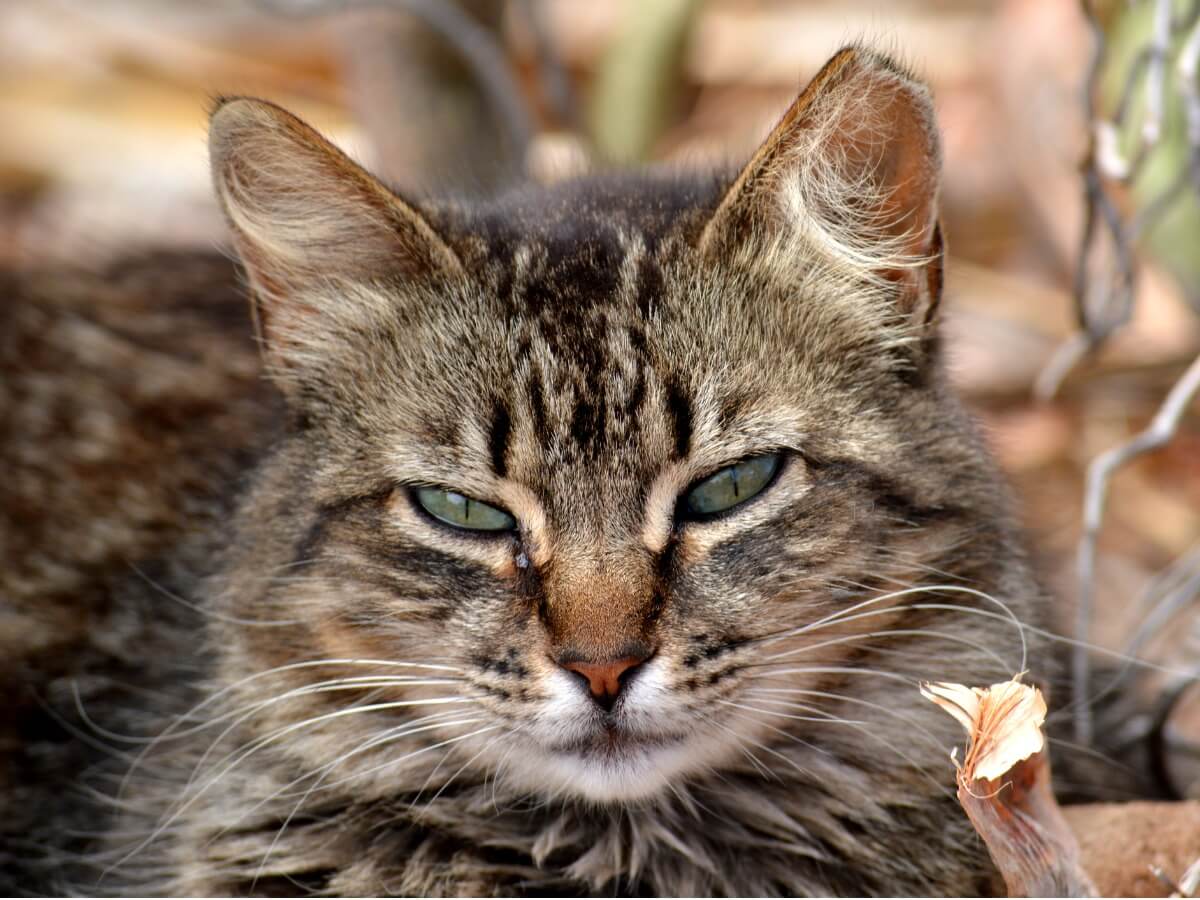Are Cats Jealous Animals?

By living with a cat you’ll see daily signs of how they can be loving and faithful. However, sometimes it’s possible to observe how cats very clearly treat one person differently from others in the home. What does this mean? Are cats jealous animals perhaps?
Although there’s no scientific evidence of this emotion in felids, owners often state that they have been able to observe it in their homes. In the following paragraphs, we delve into the question of secondary emotions in animals and how this can be applied to cats. Don’t miss it.
Jealousy
Jealousy is the feeling that arises when we perceive a threat that someone can take something that we consider to be ours. There are other emotions associated with this, such as possession or envy. Although secondary emotions have been shown to exist in animals, can jealousy be applied to cats?
As mentioned above, there’s no scientific evidence of this process in cats. Although it’s a solitary species, cats have managed to socialize adequately with other species within a home, either with humans or other animals, thanks to the domestication process.
In nature, both humans and dogs (and other predators) would be competitors for the cat.

Cats are jealous, according to owners
Although it hasn’t been shown as such that cats are jealous in any scientific article, there are records about the perception of owners about the behavior of their animals. Through these testimonies, it has been observed that home cats differentiate between individuals who live together in a house.
When the cat arrives in a new home and meets the tenants, they end up having a figure of reference that they associate with safety, food, and affection. In some cases, an opposite figure also appears, known as a “social rival”, which the owners can see is an object of jealousy.
The treatment of the cat towards the reference figure and the rival is seen as different. While the former is the object of seeking attention and affection, the opposite is attributed to behaviors of rejection and aggressiveness. This, however, could be due to poor socialization or a self-fulfilling prophecy effect, concepts other than jealousy per se.
Self-fulfilling prophecy is a psychological process in which a person ends up obtaining results that they already predicted, but that they have unconsciously caused themselves through their biased behavior.
Signs your cat might be jealous
This different treatment that we’ve spoken about manifests itself in different ways and is the most indicative record that cats are jealous animals (although it remains to be proven). Some of the signs are as follows:
- The feline seeks the attention of the reference figure regularly: to eat, socialize or simply rest.
- They pay attention when the reference figure and the opponent interact with each other.
- They interrupt these social interactions: the owners affirm that the cat places itself between the two, either asking to socialize with the reference figure or seeking to attack the rival, for example.
- They make negative calming signals or show aggressiveness towards the social rival in a general way.
What should you do when cats are jealous?
From an ethological point of view, jealousy in domestic cats can be treated as if it were a conduct disorder, as it’s a problem with the relationship between two animals. Quite often, its origin is located in poor socialization, some traumatic event, or sustained stress in the cat’s environment.
When this reaches a problematic point, interventions focus on reversing the conditioning that associates the rival figure with feelings of animosity on the part of the feline. In this way, the cat will try to associate this figure with appetitive stimuli, such as affection or rewards, gradually.
Another possibility is the use of feline pheromones (always under the approval of the trusted veterinarian) on the rival figure. This can be of help when the cat has just arrived home, or also when it’s the “rival” who is the new family member, as would be the case of a human baby, a couple, or a dog.
In any case, if the alleged jealousy of the cat is becoming a problem, it’s always best to go to an ethologist to guide you through the process. Many people believe that you can’t correct the behavior of a domestic feline, but this is far from the truth.

As you can see, until now it hasn’t been possible to take more than a pragmatic approach to the assumption that cats are jealous. Although science is often born from observations of everyday life, the tendency of humans to anthropomorphize must always be taken into account, as it can lead to biased treatments that harm the animal.
By living with a cat you’ll see daily signs of how they can be loving and faithful. However, sometimes it’s possible to observe how cats very clearly treat one person differently from others in the home. What does this mean? Are cats jealous animals perhaps?
Although there’s no scientific evidence of this emotion in felids, owners often state that they have been able to observe it in their homes. In the following paragraphs, we delve into the question of secondary emotions in animals and how this can be applied to cats. Don’t miss it.
Jealousy
Jealousy is the feeling that arises when we perceive a threat that someone can take something that we consider to be ours. There are other emotions associated with this, such as possession or envy. Although secondary emotions have been shown to exist in animals, can jealousy be applied to cats?
As mentioned above, there’s no scientific evidence of this process in cats. Although it’s a solitary species, cats have managed to socialize adequately with other species within a home, either with humans or other animals, thanks to the domestication process.
In nature, both humans and dogs (and other predators) would be competitors for the cat.

Cats are jealous, according to owners
Although it hasn’t been shown as such that cats are jealous in any scientific article, there are records about the perception of owners about the behavior of their animals. Through these testimonies, it has been observed that home cats differentiate between individuals who live together in a house.
When the cat arrives in a new home and meets the tenants, they end up having a figure of reference that they associate with safety, food, and affection. In some cases, an opposite figure also appears, known as a “social rival”, which the owners can see is an object of jealousy.
The treatment of the cat towards the reference figure and the rival is seen as different. While the former is the object of seeking attention and affection, the opposite is attributed to behaviors of rejection and aggressiveness. This, however, could be due to poor socialization or a self-fulfilling prophecy effect, concepts other than jealousy per se.
Self-fulfilling prophecy is a psychological process in which a person ends up obtaining results that they already predicted, but that they have unconsciously caused themselves through their biased behavior.
Signs your cat might be jealous
This different treatment that we’ve spoken about manifests itself in different ways and is the most indicative record that cats are jealous animals (although it remains to be proven). Some of the signs are as follows:
- The feline seeks the attention of the reference figure regularly: to eat, socialize or simply rest.
- They pay attention when the reference figure and the opponent interact with each other.
- They interrupt these social interactions: the owners affirm that the cat places itself between the two, either asking to socialize with the reference figure or seeking to attack the rival, for example.
- They make negative calming signals or show aggressiveness towards the social rival in a general way.
What should you do when cats are jealous?
From an ethological point of view, jealousy in domestic cats can be treated as if it were a conduct disorder, as it’s a problem with the relationship between two animals. Quite often, its origin is located in poor socialization, some traumatic event, or sustained stress in the cat’s environment.
When this reaches a problematic point, interventions focus on reversing the conditioning that associates the rival figure with feelings of animosity on the part of the feline. In this way, the cat will try to associate this figure with appetitive stimuli, such as affection or rewards, gradually.
Another possibility is the use of feline pheromones (always under the approval of the trusted veterinarian) on the rival figure. This can be of help when the cat has just arrived home, or also when it’s the “rival” who is the new family member, as would be the case of a human baby, a couple, or a dog.
In any case, if the alleged jealousy of the cat is becoming a problem, it’s always best to go to an ethologist to guide you through the process. Many people believe that you can’t correct the behavior of a domestic feline, but this is far from the truth.

As you can see, until now it hasn’t been possible to take more than a pragmatic approach to the assumption that cats are jealous. Although science is often born from observations of everyday life, the tendency of humans to anthropomorphize must always be taken into account, as it can lead to biased treatments that harm the animal.
All cited sources were thoroughly reviewed by our team to ensure their quality, reliability, currency, and validity. The bibliography of this article was considered reliable and of academic or scientific accuracy.
- Morris, P. H., Doe, C., & Godsell, E. (2008). Secondary emotions in non-primate species? Behavioural reports and subjective claims by animal owners. Cognition and emotion, 22(1), 3-20.
- Arahori, M., Kuroshima, H., Hori, Y., Takagi, S., Chijiiwa, H., & Fujita, K. (2017). Owners’ view of their pets’ emotions, intellect, and mutual relationship: Cats and dogs compared. Behavioural processes, 141, 316-321.
This text is provided for informational purposes only and does not replace consultation with a professional. If in doubt, consult your specialist.








